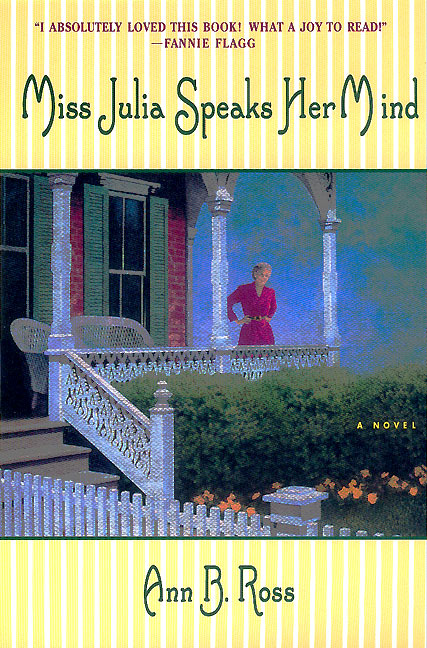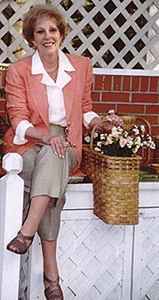 Synopsis:
Synopsis:
Wesley Lloyd Springer died suddenly on a Thursday evening in the driveway of his home. His wife of forty-four years, Julia, discovered him slumped over the steering wheel of his new Buick Park Avenue. After she recovered from the shock — and traded the Buick in for a sporty new car — she left behind a lifetime of “blissful ignorance of Wesley Lloyd’s activities, financial and otherwise.” She was determined to settle into the “benefits of widowhood and a full checkbook.” She was doing just that on a stiflingly hot summer morning. As she browsed through mail-order catalogues, deciding what items to order, she thought about all the years her husband had given her a paltry household allowance and refused to have air conditioning installed in the house because of the expense. Now that Julia knew precisely how much money her hard-working and respectable husband left her, she intended to spend some of her fortune and enjoy the rest of her life.
And then the doorbell rang. And her whole life changed again.
On her front step stood Hazel Marie Puckett, a woman too young for the “hard-living lines” Julia observed around her eyes and lips. A skinny little boy with a brown paper grocery bag in his hand stood behind her. Mistaking Hazel for a door-to-door magazine subscription salesperson, Julia was prepared to politely tell Hazel that she was not interested in purchasing any subscriptions, when Hazel blurted out her intent to enroll in beauty school in Raleigh and leave the young boy with Julia. Seeing Julia’s shock and confusion, Hazel announced that the boy’s name was Wesley Lloyd Springer, Junior, and produced a birth certificate naming Julia’s late husband as the boy’s father. Hazel turned, ran and hopped into a waiting car, as Julia called after her in vain, causing Lillian, Julia’s long-time housekeeper, to come running to see what all the fuss was about.
As Julia sighed deeply, she took a good look at the young boy and realized there was no point in denying the obvious: He looked exactly like her late husband, sans the air of self-confidence and success. “Lillian, look what else Mr. Springer left me,” she said.
Review:

Miss Julia is a formidable woman, a respected member of her small Southern community. At the very beginning of the story, she describes herself as a proud widow, entitled to that pride because she made a good choice when she agreed to marry the late Mr. Spring. Thus, her powerful place in her small community’s social circle has always stemmed from her marital status, rather than her own accomplishments.
Based upon the way she was raised, Miss Julia has always believed in very specific values and a particular way of life. Her husband took care of business matters while she devoted herself to running their home, and being active in the Presbyterian Church, along with other local organizations. Her small-town life was characterized by adherence to duty, routine, respectability, and predictability. But Miss Julia has barely had an opportunity to adjust to her new life as a very wealthy widow when everything she has believed and accepted as true up to that point is brought into question with the revelation that her late husband was involved with another woman for many years. Soon, Miss Julia learns that he provided Hazel with a home and fathered her child. All those evenings when Miss Julia thought her husband was enjoying a night out with his gentlemen friends, it seems he was actually “playing house” with his second family, Hazel and their son.
I have never known anyone exactly like Miss Julia, although she has characteristics and mannerisms that I have observed in several different people. So, I suppose I can say that she is a combination or blend of a lot of strong-minded, straight-talking women I’ve known.
~ Author Ann B. Ross
When she first learns about her late husband’s duplicity, Miss Julia is largely concerned about what her friends and fellow townspeople will think. After all, her husband was revered for his business acumen and civic leadership. She does not want his memory besmirched, because it would also reflect negatively on her. After all, if Mr. Springer strayed, it was her fault . . . wasn’t it? Miss Julia observes that “it’s always the wife’s fault if a man strays . . . There’s always something the wife’s doing, or not doing, that pushes a man over the brink. That’s just the way it is.” Miss Julia grew up in an era and locale where women actually believed that.

Miss Julia arrives a crossroads. She must make a decision, the impact of which will determine both her future and Wesley Lloyd, Jr.’s. Her choice turns out to be a perfect reflection of what she has learned through an examination of beliefs after learning the truth about her life and marriage. But the end of the story, Miss Julia is newly empowered and rejuvenated. Miss Julie is beginning a new phase of her life, at peace with her decision and the benefits she is reaping from it: Although she was never able to have children of her own, she finds herself the unlikely matriarch of an unusual family forged in the aftermath of betrayal, shock, and adversity. As the first book in the series draws to a close, it is clear that Miss Julia and her little flock are going to be just fine . . . and experience more adventures in the succeeding volumes.
Miss Julia Speaks Her Mind is a delightful story that will have you laughing so hard you cry one moment, and empathizing with Miss Julia’s predicament the next. Miss Julia is bigger than life, but thoroughly believable and so authentic that you will find yourself wondering if author Ann B. Ross patterned her after one of your own family members or friends. Most of all, she and her little family will take up residence in your heart, compelling you to read the successive volumes in the series.



5 Comments
I love Miss Julia and remember reading a couple of these in the past. Since I have declared this the summer of the cozy, I’m putting her on my list to read starting at the beginning – thanks for a great suggestion.
OK, I’ve got to admit I only read the first few paragraphs of this review, because that was all it took to convince me that I want to read the book! And I don’t want to know too much about it beforehand. This sounds like something I would really enjoy, so on the to-read list it goes.
I have to tell you that I love the look and feel of your blog–so lovely and inviting!
Hope you’ll check out my latest review:
Cindy’s Book Club
P.S. I just followed you on Networked Blogs.
I love Miss Julia!! This book was one I read late at night and I was laughing so hard I thought I was going to wake up my husband. I have enjoyed all the books in this series.
Pingback: Saturday Review of Books: June 4, 2011 | Semicolon